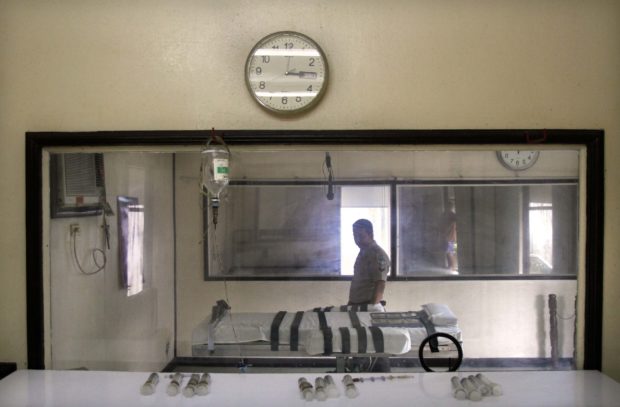
This file photo was taken on Oct. 10, 2014, to mark World Day vs. Death Penalty. This is the lethal injection chamber in the New Bilibid Prison. Windows with a one-way mirror for NBP staff and family members are in two separate rooms. Should the death penalty be reimposed is a much-discused topic in the Philippines. (File photo by LYN RILLON / Philippine Daily Inquirer)
MANILA, Philippines — President Ferdinand Marcos Jr. appears to still be undecided about whether the death penalty should be reimposed, saying that there are practical and moral concerns surrounding the said policy.
His goddaughter, actress Toni Gonzaga, asked Marcos about the issue in an exclusive interview on Tuesday.
“[The] death penalty is a tough one because there is a practical issue and a moral issue involved. And the question is: Does society have the right to kill its own people. And that’s a tough one to get around,” Marcos told Gonzaga.
“And as a practical matter, does the death penalty actually, does it discourage people from committing heinous crimes? And I think the data not only from the Philippines but from other countries shows that it doesn’t. We have to be very stringent about applying the law,” he added.
Even when he was still campaigning for the presidential elections, last March 19, Marcos said he did not think the death penalty was effective in curbing crime, particularly heinous ones.
During the two-decade rule of his namesake father, however, the death penalty was implemented. Just four months after the declaration of martial law in September 1972, the older Marcos ordered the execution of drug lord Lim Seng by firing squad in Fort Bonifacio.
Plans for a drug war
In the same interview, Gonzaga asked Marcos about his plans for fighting illegal drugs.
Observers, including supporters of the previous administration of Rodrigo Duterte, noted that Marcos did not mention the issues in his first State of the Nation Address on July 25.
Marcos said he deliberately refrained from talking about it. He wanted policies to be set in place first.
“I didn’t because I had already explained it, and I think it’s an internal matter. The war on drugs will continue, but we have to do it in a different way. Until we formulate fully our policies, we can’t say because we are, even as we speak, there are working groups putting together the new war on drugs.,” Marcos said, speaking in a mix of Filipino and English.
“We’re looking more at the upstream of the problem — the prevention,” he continued. “Let’s teach the kids: ‘Don’t get into that. You won’t amount to anything with that. Most of those who got into are already in jail or they’re dead. So why would you want that, right?’”
Marcos added that his administration was formulating a plan for rehabilitation.
“And those who are already involved or already addicted, we should treat them. In fact, right now we are trying to formulate how: What is the latest and what is the best way for the rehabilitation,” he said.
“These are all being formulated. And even on the enforcement side, I’d like to formulate that. But that will take another whole SONA just to explain,” he added.
Gonzaga’s interview with Marcos was aired on Tuesday, in time for his 65th birthday. In the early part of the program, Marcos gave a tour of Malacañang Palace, reminiscing the days when his family lived there.
Marcos also told Gonzaga that he would want to talk to people who were thinking that his presidential bid was a carefully thought out plan. He said there were many stumbling blocks and mistakes that his team had to go through.
According to the President, critics are giving them way too much credit.
RELATED STORIES
Bongbong Marcos believes death penalty not effective in curbing crime rate
In The Know: Execution of drug lord Lim Seng
Marcos debunks myth of a well-planned path to presidency